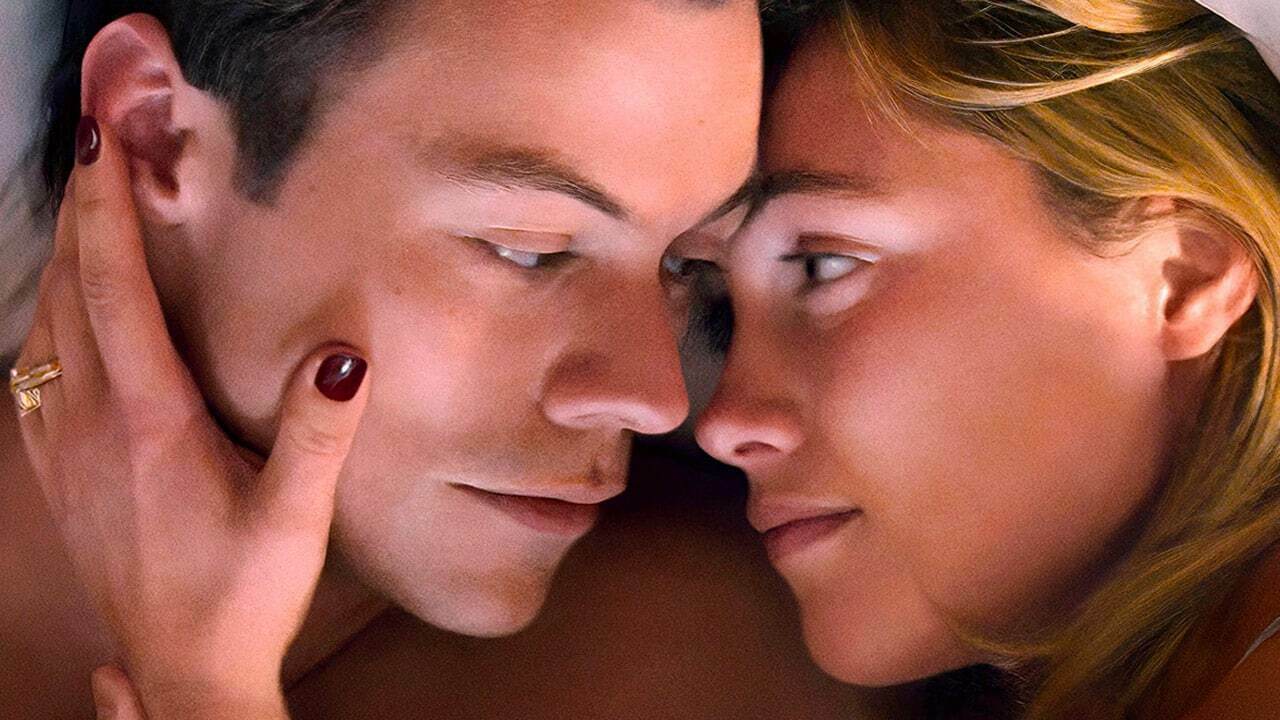
The second feature film by Olivia Wildewhich premiered at the last Venice Film Festival, made people talk more about the relationships between the cast members (especially the triangle Olivia Wilde, Florence Pugh e Harry Styles) and of the quarrelsome dynamics around the first Venetian that of the story itself.
The media amazement created around Don’t Worry Darling seems to have made more news than the film itself, starting with the replacement of Shia Labeouf con Styles up to the intricate alternations that have held the bench since the first testimonies from the set.
Although the wait was so long, the story is not fully successful: it does not fully compare with the ideas that it seems to propose in its premises, even if after the result, not all the work is to be thrown away.
The feature film is now available digitally on CHILI.
Trama di Don’t Worry Darling
Florence Pugh interpreta Alicea housewife residing in Victory, an idyllic suburb that looks like Palm Springs, where everyone drinks at night and Alice e Jack (Harry Styles) seem to live in a perennial honeymoon, always in the throes of passion.
The cars and clothing date back directly to the 1950s, the furniture is avant-garde, as well as the gender roles and labels well reflect the times narrated.
In this expanding community of 72 residents, men do top secret desert jobs, driving to work directly on unpaved roads to the top of a mysterious hill.
And if one of the wives asks what they do, a simple “you wouldn’t understand” from her husband ends all conversation about it.
Frank (Chris Pine) is the architect of the community. He also hosts a one-hour radio show that is broadcast in every home, specifically aimed at the wives residing in Victory. Women are involved in maniacal housekeeping, shopping and aperitifs, cooking perfect dinners. They just shout “I’ll take it!” when an item is presented in a show room and charged to a company account.
The same Wilde plays the best friend of Pugh to Victory, whose husband (Nick Kroll) just got a promotion with a ring blessed by Pine. E Gemma Chan appears on stage as ShelleyFrank’s supportive wife, a dance instructor for housewives, teaches them not only to dance on pointe but also how to maintain a certain behavioral behavior.
Obviously in Victory nothing is as it seems. Once Alice sees (or perhaps hallucinates) a plane crash in the mountains, followed by a suicide on top of one of the community’s beautiful houses, starts asking questions. And the personality of Pine becomes essential when Pugh really begins to question everything.
The strengths of the story
Wilde confidently directs his grammatically incorrect science fiction thriller. The increase in production compared to his debut work, Booksmartis easily discernible and the film is triumphant in areas such as art direction (Katie Byron), costume design (Arianne PhillipsOscar nominee for Once upon a time in… Hollywood) and the soundtrack of John Powell.
The music tells the full story of the 50s and plays a captivating element with famous songs such as Oogum Boobum from Brenton Wood, Don’t Worry Baby of the Beach Boys, Bang Bang from Nancy Sinatra, Suspicious Minds from Elvis Presley.
The director of photography Matthew Libatique (Black Swan, A Star is Born) makes the story pop, colorful and at times visually disturbing, with sparkling sparks, sometimes excessive.
As for the direction, the ambitions of Wilde they have grown since his first effort and in fact we witness dreamlike scenes, sets that become labyrinths, car chases in which each floor becomes more complex; In this the director demonstrates that she is up to the role by playing with symmetries, creating images that remain.
The script for Don’t Worry Darling
The problem of Don’t Worry Darling is the script written by Katie Silberman (who also wrote the brilliant Booksmart). History is a fusion of a whole host of influences. The Stepford Wives, The Truman Show, Black Swan, Black Mirror and even The Thirteenth Floorthe era of Matrixjump into the foreground, with the same Wilde unable to smooth out the many inconsistencies, plot holes and general air of uncertainty that emerge as a result of his plot-to-puzzle montage.
The script throws ideas to the wholesale viewer, expecting them not to question them. But questioning is all that audiences usually do as soon as the credits begin. Why were the eggshells actually empty, for example? Because Shelley does he seem to take matters into his own hands by revealing something fundamental and then his character is no longer visible?
Don’t Worry Darling in reality she has no answer to almost anything, the director seems to hope that the viewer does not remember all the open pieces trying to distract him with the shimmering aesthetics of the artfully chosen images.
Silberman e Wilde have excellent ideas to demonstrate the fragile state of mind ofAlice from Florence Pugh, but the film quickly loses logic and therefore all we get out of it are ideas without the director’s courage to engage in something bigger, wider narrative choices.
If the first part of the story throws a series of ideas, hints, with a story that, although not new, has its own meaning and intrigues the viewer, the second does not keep up with the rhythm, does not close any enigma opened in the first half, interesting parentheses that had been opened are not closed and this also detracts from the value of the product which from an interesting psychological thriller becomes an unsolved thriller, without any explanations that would have been necessary.
The role of Florence Pugh and the rest of the cast
Pugh it is the glue that holds Don’t Worry Darling moving through his 1950s world of patriarchal domesticity. The British actress takes on the entire responsibility of the film, becoming its driving force. The young English actress has now proved it several times, she not only pierces the screen, but she has a charisma capable of giving greater charm to every project in which she is involved. The same cannot be said of Harry Styles (which we had seen cinematically so far only in Dunkirk from Christopher Nolan, with a small role in an ensemble cast). The English singer gives a portrait of the character of him who does not remain and who constantly remains in the shadows, not only with respect to Pugh but also in comparison with the rest of the cast. The supporting roles played by Chan, Pine e Wilde they are well thought out and represented but their narrative potential is not developed.
Final conclusions
On a positive note, the patriarchal vision of women of the 1950s, seen only as perfect housewives, is overturned in a perhaps somewhat forced attempt at feminism. In the subject of Silberman men are unable to see talents in their wives or understand their desire for independence, but it is thanks to women that the mysteries of the plot begin to be stirred up.
The main problem with the film is that it ends where it is about to begin, in the final scene we expect the explanation and the twist that never happens.
It was necessary on the part of the director and the screenwriter to transform the ordinary of the first part into the extraordinary in the second, otherwise a story told in this way seems a copy of previous works and the directorial flicker, which is the element that makes the feature film unique, comes to to miss.
The interesting direction was not supported by going one step further.
Don’t Worry Darling it is however a quite enjoyable film as a whole, it has a rhythmic rhythm and entertains for the whole two hours of duration. It is just a pity that we have preferred a sketchy story to a well-squeezed logic, with undercooked ideas at the center.
Source: https://www.movieblog.it/recensione-dont-worry-darling-il-nuovo-film-di-olivia-wilde/?utm_source=rss&utm_medium=rss&utm_campaign=recensione-dont-worry-darling-il-nuovo-film-di-olivia-wilde


